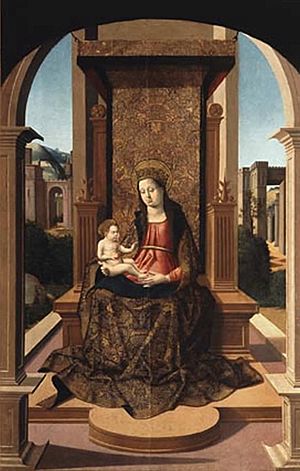Pedro Romana facts for kids

Pedro Romana (born around 1460, died 1536) was an important Spanish painter during the Renaissance period. He was known for creating beautiful religious artworks.
Early Life and Career
Pedro Romana was likely born near Córdoba, Andalusia, a city in Spain. He worked as a painter there from 1488 until his death in 1536. He mostly painted religious scenes for churches. Many of his works were large altarpieces, which are decorated screens placed behind the altar in a church.
Painting Style
Romana's art style is part of what is called the Córdoba School of painting. This means his work shared common features with other artists from that region. However, he was also influenced by art from other places. You can see hints of both Flemish (from areas like Belgium and the Netherlands) and Italian art in his paintings.
Key Achievements and Challenges
In 1515, Pedro Romana was chosen to be the president of the Guild of Saint Luke. This was a special group for artists, like a professional club. Being president showed that he was a respected artist in his community.
Like many people, Romana sometimes faced challenges with money. Records show that in 1528, he had some financial difficulties.
Famous Works
Pedro Romana created many artworks, but two are especially well-known:
- The Adoration of the Magi: This painting was made for an altarpiece in the church of Espejo, which is also in Córdoba.
- Virgin and Child: This beautiful painting, created in 1488, can be seen today at the Museo de Bellas Artes (Córdoba) (Museum of Fine Arts in Córdoba).
See also

- In Spanish: Pedro Romana para niños
 | Anna J. Cooper |
 | Mary McLeod Bethune |
 | Lillie Mae Bradford |

